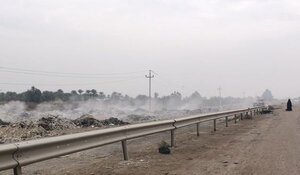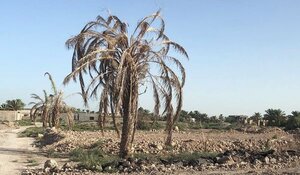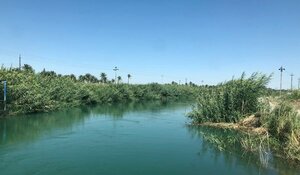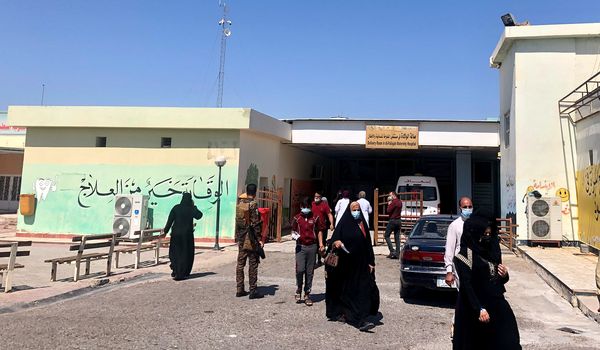This year marks the 20th anniversary of the 2003 US invasion and occupation of Iraq, followed by a decade of US-led counterinsurgency and prefaced by a decade of sanctions, a previous US war, and the Iran Iraq war. While an arrest warrant has already been issued for Russian President Putin for the invasion in Ukraine by the International Criminal Court, there has been no accountability for the disastrous effects of the illegal US-led invasion of Iraq, or the myriad foreign interventions that have impacted Iraq’s capacity to sustain thriving life. In fact, a recent New York Times article of Alissa Rubin on Iraq’s damaged environment omits the US occupation altogether. The incapacitation of thriving is a predictable result of wars, and while many write about the devastating effects of bombing Ukraine, the source of wheat and fertilizer for much of the world, a similar effect is already playing out in Iraq, the cradle of sedentary agriculture.
Privatization, signature of US occupation
Undeniably, the US invasion of Iraq caused mass death, the assassination of doctors, and the mass exodus of the population in the early 2000’s. The legacy of this war and its preceding wars included destroyed infrastructure that made it difficult for communities to thrive: cholera outbreaks from poor water quality, malnutrition from protracted displacement, disruptions to education, power outages, etc. This is in addition to the inundation of the landscape with millions of tons of metals and bomb fragments, including depleted uranium, and the widespread use of burn pits on US military bases that released dioxins and other health hazards into the air for over a decade.

The long-term effects of US intervention, however, are the result of policies written in the early 2000’s and slowly actualized over the course of decades: despoliation by economics, the gutting of public resources. Environmental deregulation and privatization of once-public resources like healthcare, municipal water filtration, public electricity, and regulated factory outputs have had harmful effects on Iraq’s human population and its diverse ecologies. Iraq’s government and economy were entirely restructured under the Coalition Provisional Authority in 2005, reshaping political representation but also opening Iraq’s economy so that private, transnational enterprise could operate with minimal environmental or labor regulations, siphon profits out of the country without infusing resources back into the community, and bear little or no accountability for damage to ecosystems, neighborhoods, or workers’ health. These policies, initially called Orders 1-100, were antecedents to contemporary laws and economic structures in Iraq.
Despoliation and Dispossession
Two decades after this widespread privatization, it is no wonder to see despoliation of the environment: degraded farmland, rapid tree loss, and the dispossession of farmers. Ahmed, a farmer who grew date palms and other tree crops in a village outside of Fallujah, spent years recovering his trees and soil from a period of displacement in 2004 by the US. His trees died during his absence, but when he returned, Ahmed was dedicated to revitalizing the soil and replanting trees. He sought support from the government to rebuild the soil and raise new trees to maturity. Instead, he found these resources were severely limited. Like other farmers, he turned to private agribusiness to purchase seeds under contract. When he was displaced again in 2014, his trees had only just matured to produce a full crop each season: several years of drought and dust storms made their progress slower than usual. Unable to harvest in 2015, and with a debt to pay, Ahmed was forced to sell his land. Now, he works as a seasonal laborer on land owned by someone else. He told me, “It’s a combination of money and drought” that left him landless. “The government is not for the people. Farmers do not get support like we used to.” Under policies like the original Order 81, the privatization of the agricultural sector renders farmers a delayed casualty in the long wake of war.

With a gutted public sector, the burdens of making and sustaining life have been left to individual people and families. In urban areas, unreliable public infrastructure puts more vulnerable people at risk of heat stroke, asthma, and diarrheal disease. Families who once drank water from the tap and used electricity from the public grid are now forced to purchase individual disposable water filters, consume bottled water, and operate diesel generators for lighting and cooling, if they can afford it. These methods for surviving accelerate the cascade of ecological damage and exacerbate financial inequality by burdening families to seek private pay solutions.
Reproductive Injustice
The cascading effects of privatization policies in the wake of US occupation impact women disproportionately. A country that boasted the highest literacy rates for girls in the region lost this status and has become one of the lowest. With plummeting education levels, so too the age of marriage, an indicator of women’s diminishing social status. In my research interviewing 80 women in and around Fallujah who gave birth since 2017, a large number described obstetric hardships related to dismantled infrastructure and deprivation of public resources. For example, during my visits to the public hospital, I learned that one reason women prefer cesarean sections is because the public hospital lacks the resources to provide pain medication to women who are not undergoing surgery. Budgeting resources at public hospitals is not uncommon, but this level of resource management is an extreme result of both war-induced infrastructural damage and lack of reinvestment in public resources.
While some scholars have linked a high incidence of congenital anomalies in cities like Fallujah to military environmental contamination, what makes many congenital anomalies lethal is the lack of infrastructure and expertise to provide timely in-country surgeries. Relatedly, most women who have children with disabilities bear sole responsibility for caretaking. In some towns, public schools without resources for wheelchair ramps send physically disabled children home for their mothers - many of whom were deprived of education themselves — to teach them what they can, without support of any kind.

Iraqi communities, particularly those cultivating new lives on the landscape, are under-supported and left to find private means of survival. But people are also mobilizing to reclaim Iraq’s resources for itself. The 2019 protests included calls for changes to environmental regulation, economic policy, women’s rights, and political representation. Grassroots organizations like “Humat Dijlah” and the “Organization for Women’s Freedom in Iraq” are calling for international support in their efforts to repair local ecologies, restore women’s rights, de-privatize Iraq’s economy, and support the next generation of lives in Iraq. Their efforts take place in spite of impunity and neglect in the international community.
Pointing Out Hypocrisy Is Not Enough
While hypocritical that the US would support criminal prosecution of Putin for war crimes not unlike those performed by the US in Iraq, this hypocrisy merely illustrates the modus operandi of imperialism. Those accountable, whether imperial powers like Russia and the US or private companies that profit directly and indirectly from the destruction of local ecosystems and communities, reduce the capacity of landscapes to sustain the lives they hold. Such entities do not act according to their stated values on their own volition: they respond to pressure.
Women’s rights advocates, environmental activists, labor organizers, and political dissidents have been calling for greater joint struggle to protect the public — people’s rivers and trees, their children and elders. It is up to us as witnesses to follow grassroots leadership in campaigns for justice and to push for accountability (22 August 2023).

